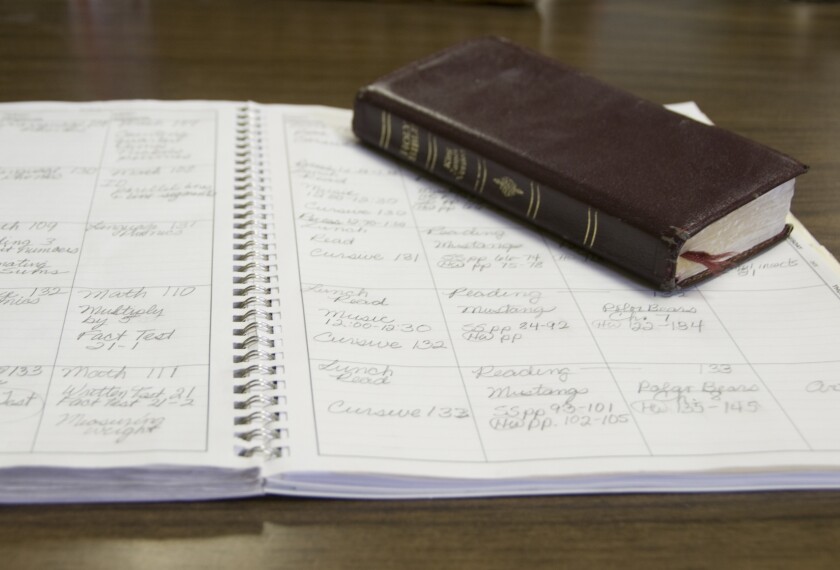Over the past year, some parents and activists have attempted to ban books about race, gender, and sexuality from classrooms and school libraries, sparking national headlines and controversies.
A new, nationally representative survey of educators sheds some light on how common these book censorship requests are—and which subjects are most frequently challenged. The EdWeek Research Center surveyed 1,200 teachers, principals, and district leaders in the second half of December.
Over the past three years, almost two-thirds of school and district leaders have not fielded any requests to ban or remove books, the survey found. But 16 percent of school and district leaders say the number of requests to ban books has increased since 2019, while just 2 percent say they have decreased. (Nineteen percent said there’s been no change.)
Books with LGBTQ characters or issues topped the list of reported challenges, with nearly half of school and district leaders who reported book ban requests saying they’ve had somebody ask to remove or ban books of that nature. Other frequently challenged subjects include sex and sexuality that is not violent or abusive, critical race theory, ethnicity/race, racial inequities, gender, and non-traditional family structures.
Suburban administrators are more likely to say book censorship requests have been on the rise than their peers in rural or urban districts. Additionally, more than 1 in 3 administrators in districts with 10,000 or more students report that the number of book ban requests has increased over the last three years. Only 8 percent of administrators in districts with less than 2,500 students reported the same.
The EdWeek Research Center survey results are in line with the American Library Association’s annual list of the top 10 most challenged books in K-12 schools, colleges, and libraries.
In 2020, the most recent year for which the ALA has data, the novel Melissa by Alex Gino—previously published as George—was the most frequently challenged for its depiction of a young transgender girl. The list was otherwise dominated by books about racism, including: Stamped: Racism, Antiracism, and You, a middle-grades adaptation of Ibram X. Kendi’s book about the history of racist ideas in America; All American Boys, a young adult novel that follows the perspectives of both a Black and a white teen after a racist incident of police violence; and Something Happened in Our Town: A Child’s Story About Racial Injustice, a children’s book about the aftermath of a police shooting of a Black man.
Deborah Caldwell-Stone, the director of the American Library Association’s Office for Intellectual Freedom, said in a November statement that there has been an “unprecedented volume of challenges” to books in fall 2021. Those challenges are largely against materials that focus on LGBTQ issues and books by Black authors or that document the experience of people of color, according to the ALA.
“In my 20 years with ALA, I can’t recall a time when we had multiple challenges coming in on a daily basis,” Caldwell-Stone said.
Critical race theory is cited in many of the complaints, experts say, even if the content in the book has little to do with the academic framework, which posits that racism isn’t just the product of individual bias but is embedded in legal systems and government policies. Over the past year, 13 states have restricted teaching about critical race theory or how teachers can discuss race and gender in class.
Even though most districts haven’t seen overt challenges, the national climate “could create a chilling effect where teachers stick to what they’ve always taught because they perceive it’ll be an easier pathway, there will be less resistance, and that’s such a loss to society, to students, and to teachers,” Emily Kirkpatrick, the executive director for the National Council of Teachers of English, told EdWeek in September.
Yet the EdWeek Research Center survey results show that 57 percent of teachers and 63 percent of principals, along with slightly less than half of district leaders, can come up with a topic they think should be banned from books in their districts’ libraries and classrooms.
Sexual violence or abuse is the topic teachers, principals, and district leaders are most likely to say should be banned, followed by white power/nationalism and critical race theory. Seventeen percent of educators say that books featuring LGBTQ characters or issues should not be allowed in schools.
Education experts say that children should have access to diverse books that serve as “windows and mirrors"—they should expose readers to new worlds and perspectives while also reflecting readers’ own experiences.






